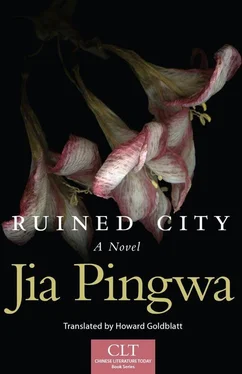“Gentle yet strong-willed? What an interesting way to put it,” Zhuang said.
“There are many types of women: the svelte, light-skinned, elegant type; the fair, delicate type; the sallow, puffy type; and the dark, scrawny, coarse type. Tang Wan’er is the fair, delicate type. Had she been a virgin, her menstrual napkin would have been ideal.”
Zhuang stuffed the scrap into his pocket.
“You’ve never been to court before,” Meng said. “In movies they look scary, but in reality a local court is quite simple. There is a small room with three tables. The judges sit at the middle one, with the presiding judge in the center; the court clerks sit at side tables. Other tables, perpendicular to those in front, are for the lawyers. There are also two rows of wooden chairs, one for the plaintiffs and the other for the defendants. It’s like holding a meeting, nothing to worry about. I’ll stay home and use my mind to help you with qigong.”
“I was going to tell you I don’t want to go. I asked you over to see if you wouldn’t mind going in my place.”
“Have me go in your place? That won’t work. You need a court’s approval to send a proxy, and you’ll have to fill out forms.”
“Earlier I placed a call to the judge, Mr. Sima. He hemmed and hawed before finally agreeing to my request. He told me to write a power of attorney for you to take along tomorrow morning, and that will do it. To be honest, I don’t want to see Jing Xueyin in a place like that. You’re the only one who knows this. I don’t want anyone to try to force me to go. You can bed down here tonight. That will give you time to familiarize yourself with my defense.”
“You got me this time. I must have owed you something in a previous life,” Meng said, before he shouted, “Ai-ya! Now I understand what the trigrams meant. The sign of a major figure was referring not to you, but to me.”
“In that case, it’s your fate and I don’t owe you a thing.”
Zhuang got up at first light and, after a few words with Meng, sneaked out the door. There were few people out at that hour — street sweepers sending dust flying and elderly joggers holding pocket radios to their ears. Zhuang, who had never been up that early, had no idea where to go, so he walked toward the small lane of banner makers. Vehicles were normally not allowed in the lane, where colorful banners hung on wires, a minor scenic sight in the city. It had been a long time since Zhuang had been there, so he decided to go in and take a look. He had another idea in mind: if he won the case, he would ask Zhou Min to have one made and send it to the court. When he got deeper into the lane, he saw no banners; instead, all the shop signs had been changed to “Advertisement Workshop,” “Business Card Studio,” and the like. Early risers were already putting up advertising signs of various types above their shops.
“What happened to all the banner makers?” Zhuang asked one of them.
“Haven’t you heard the song ‘Follow Your Feelings’? In the past, the Communist Party had so many meetings where banners were given out that everyone in this lane made banners for a living. Once the party started to focus on practical economic matters, the banner business went downhill. On the other hand, ad wars are everywhere, and no one goes out without business cards. The shift has improved our business ten times over.”
Zhuang voiced his understanding and amazement before heading down another lane, where he had barely taken twenty steps before meeting up with the woman Liu and her milk cow. He stopped and drank some fresh milk right from the cow. When he was done, he walked off, taking the cow’s lead.
“Don’t do that. People will laugh at you or say I have no sense of propriety.”
“I have nothing to do today, so let me lead the cow for you. It’s my turn now, after drinking her milk for a year.”
. . .
The cow was moved by what she heard Zhuang say, but instead of snorting or flicking her ears and tail, she walked slowly, as if her legs were lead pipes. She listened as her mistress chatted with Zhuang.
“She’s acting weird these days. She doesn’t eat much and gives less milk than she used to. Every time we walk through the city gate, she digs in her hooves, refusing to move, as if I were taking her to the slaughterhouse.”
“Could she be sick? You can’t keep milking her without any concern for her health.”
“You’re right. I should take her to see a veterinarian.”
The cow’s eyes grew moist when she heard the exchange; she was not feeling well, was weak, with no appetite. She had no idea why she was so agitated about walking through the gate, except that she was reminded of her earlier days on Mount Zhongnan. It had been a long time since she had left her own kind, and she wondered what they were doing now. How refreshing the air was in the trees atop mountains shrouded in a blue mist and in the grass along the river. How crisply the birds sang and how clearly the water flowed. Were they grazing by the river, sticking out their long tongues to bring in mouthfuls of tender grass like scythes? Were they standing together atop a gentle rise, twisting and turning freely, comparing bones and muscles, sneezing, mooing? Were their long lowing sounds traveling far off to the cliffs before returning to fill the mountains and valleys with their echoes? Were they running over to an expansive grassy land, sending grasshoppers flying in all directions, while a tiny bird with a green beak stood firm on one cow’s back? Did it refuse to fly away even when other cows butted up against it? Or were they raising their tails to relieve themselves, their droppings shapeless on the ground like puddles of watery mud, steaming up in the gentle sun and incurring curses from the land’s owners? Did the men still use terrible language, so awful that they sounded more like they were scolding their wives or sons? Every time the cow thought about all this, she realized how much she longed for what she had not cherished in the past and could never return to now. She recalled how everyone, male and female, young and old, had looked at her with envy when she was chosen to come to the city. They had circled her joyously, licking her head and tail with their soft tongues. She was smugly happy, of course. Even now, they might still be talking about her and envying her on their way back to the pen from the field under a starry sky. They probably tried to imagine the glorious city life as they worked the fields or rested between turns around the millstone. How could they know the loneliness, the isolation, and the indefinable distress she felt? It was true that she ate good food and saw new sights, and her new mistress did not make her work the field or carry any burdens. But she felt suffocated by the city air, with its mixture of odors from face powder, cigarettes, and sulfur, which congested her chest and made her nauseous. The hard cement road surface lacked the sponginess of newly tilled land, causing her hooves to blister and fester. What had worried her was finally happening: her strength was weakening and her personality changing; even her stomach was acting up. With a diminished appetite and a depressed mood, how could she be expected to give much milk? She wished she could yield vast quantities every day, even fantasizing that it was her milk, not water, coming out of the faucets for all the city’s residents to drink and thus become cows, or at least be endowed with the strength of cows. But that was not possible. Not only could she not change the people and their temperament, she was actually slowly losing bovine traits because of her surroundings. Imagine this: she often thought about going back to the mountains, but her own kind might not recognize her, and she would likely have trouble adjusting to the life there if she were to return one day. The cow regretted coming to the city whenever such thoughts visited her, for that had led to a miserable fate and a cruel punishment, rather than honor and good fortune. She had thought of slipping away at night several times, but the new owner loved her so much that she kept her tethered inside the house, making escape impossible. And of course, there was no way she could leave without telling her owner why. How sad that she could not talk like humans; otherwise she could tell the mistress, “Please let me go eat grass and drink water in the wild. I would rather starve to death in the mountains or be bitten to death by gadflies than stay here. City life is not for cows.” Every night she dreamed of tall mountains and flowing water, dark forests and vast expanses of grass and newly tilled soil. She even dreamed about running away; in her dream, she fought a leopard that was terrorizing the city, dying together with it in the end from exhaustion, after which her soul happily escaped from the city, once she repaid her owner and Zhuang Zhidie for their kindness. But she woke up with tears in her eyes and sighed, “I’m afraid I’m sick. I’m truly sick.”
Читать дальше


![Matthew Vincent - [you] Ruined It for Everyone!](/books/216429/matthew-vincent-you-ruined-it-for-everyone-thumb.webp)









